Sydney, Feb 13: Eight Pakistan players, including maverick former captain Shahid Afridi, have been fined for breaching a team curfew ahead of their crucial World Cup game against India, sources told AFP today. They have also been warned that a repeat offence will see them kicked out of the tournament which starts on Saturday.
"Eight of the Pakistan players, which also included former captain Shahid Afridi and opener Ahmed Shehzad, were fined 300 Australian dollars (USD 230) after they came late to their Sydney hotel on Sunday," sources in the Pakistan team told AFP on condition of anonymity.
The eight players include senior all-rounder Shahid Afridi, opener Ahmed Shehzad, Wahab Riaz, Haris Sohail.
The official said the players had gone out for dinner with a friend in Sydney before the warm-up game against Bangladesh.
"After dinner, they went for an outing and returned to the hotel late. They have been fined 300 Australian dollars each."
The players had returned to the hotel about an hour after the curfew timings set by the manager.
But a source told PTI that the matter became serious when some pictures of Afridi were posted on a social network site and a prominent local Pakistani Australian informed the team management that Shehzad had got into an argument with a Pakistani fan at a club.
The players are understood to have apologised and have promised not to repeat the offence.
The team management, headed by manager Naveed Cheema, a former military man, claimed the players arrived 45 minutes late after a night out. "These players went with their friends for dinner but came back late," said a team source.
Team management have told the players that if such a breach was repeated, they will be sent home on the first available flight.
Pakistan are placed in Group B of the 14-team World Cup which starts in New Zealand and Australia from Saturday.
Pakistan play their first group game against arch-rivals and title-holders India in Adelaide on Sunday. Pakistani players have a history of off-field discipline problems.
Three key players -- Salman Butt, Mohammad Asif and Mohammad Aamer -- were caught in a spot-fixing scandal in England in 2010. The trio was accused of taking money to orchestrate deliberate no-balls during the Lord's Test. All three were banned for five years by the International Cricket Council. They, along with their agent Mazhar Majeed, were also jailed in UK.







Comments
Add new comment